

Big Five personality traits. In psychology, the Big Five personality traits are five broad domains or dimensions of personality that are used to describe human personality.

The theory based on the Big Five factors is called the five-factor model (FFM).[1] The five factors are openness, conscientiousness, extraversion, agreeableness, and neuroticism. Acronyms commonly used to refer to the five traits collectively are OCEAN, NEOAC, or CANOE. Beneath each global factor, a cluster of correlated and more specific primary factors are found; for example, extraversion includes such related qualities as gregariousness, assertiveness, excitement seeking, warmth, activity, and positive emotions.[2]:24 The Big Five model is able to account for different traits in personality without overlapping. Empirical research has shown that the Big Five personality traits show consistency in interviews, self-descriptions and observations. §Five factors[edit] How to Make Trillions of Dollars. Before I get into it, I must say that I don’t recommend that you do this.
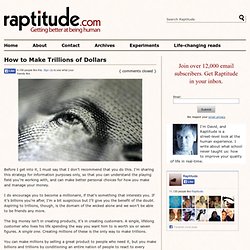
I’m sharing this strategy for information purposes only, so that you can understand the playing field you’re working with, and can make better personal choices for how you make and manage your money. I do encourage you to become a millionaire, if that’s something that interests you. If it’s billions you’re after, I’m a bit suspicious but I’ll give you the benefit of the doubt.
Aspiring to trillions, though, is the domain of the wicked alone and we won’t be able to be friends any more. The big money isn’t in creating products, it’s in creating customers. How Tim Cook is changing Apple. FORTUNE -- In February of this year, a group of investors visited Apple as part of a "bus tour" led by a research analyst for Citibank.

The session started with a 45-minute presentation by Peter Oppenheimer, Apple's chief financial officer, and the 15 or so investors who attended the session were treated to Apple's unique brand of hospitality: They met in a threadbare conference room in Apple's Town Hall public conference center at the 4 Infinite Loop building in Cupertino, Calif., where the refreshments consisted of "three stale cookies and two Diet Cokes," in the words of one participant. All that, save the meager refreshments, is routine for big public companies in Silicon Valley, which use the check-ins as opportunities to communicate with large owners of their stock. After the CFO finished, Cook, at that point chief executive of Apple for all of five months, stood to offer his remarks. Tim Cook at a March event introducing the new iPad in San Francisco. Technology - Alexis Madrigal - How Google Can Beat Facebook Without Google Plus.
8 Fairy Tales And Their Not-So-Happy Endings. Looking At This Map For 5 Seconds Will Change How You Think About Race. You're Alone All The Time. Clay Shirky: How cognitive surplus will change the world. Tapping the Cognitive Surplus. The sudden bounty of accessible creativity, insight, and knowledge is a public treasure, says a network guru.
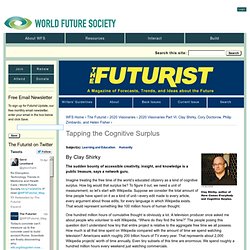
Imagine treating the free time of the world’s educated citizenry as a kind of cognitive surplus. How big would that surplus be? To figure it out, we need a unit of measurement, so let’s start with Wikipedia. Suppose we consider the total amount of time people have spent on it as a kind of unit—every edit made to every article, every argument about those edits, for every language in which Wikipedia exists. That would represent something like 100 million hours of human thought. One hundred million hours of cumulative thought is obviously a lot. The good news about our current, remarkable age is that we can now treat free time as a general social asset that can be harnessed for large communally created projects, rather than as a set of individual minutes to be wiled away one person at a time.
Cognitive Surplus: The Great Spare-Time Revolution. Clay Shirky and Daniel Pink have led eerily parallel lives.
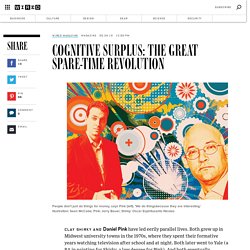
Both grew up in Midwest university towns in the 1970s, where they spent their formative years watching television after school and at night. Both later went to Yale (a BA in painting for Shirky, a law degree for Pink). And both eventually abandoned their chosen fields to write about technology, business, and society. Imagination - Play with beautiful wavy lines. Evolutionary Psychology and the Antimarket Bias. Economic illiteracy is widespread, but why should this be a problem?
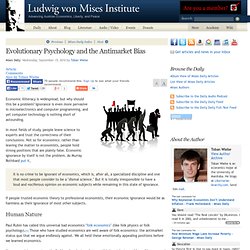
Ignorance is even more pervasive in microelectronics and computer programming, and yet computer technology is nothing short of astounding. In most fields of study, people leave science to experts and trust the correctness of their conclusions. Not so for economics: rather than leaving the matter to economists, people hold strong positions that are plainly false.
Economic ignorance by itself is not the problem. Belief in Nothing. Nihilism confuses people.

"How can you care about anything, or strive for anything, if you believe nothing means anything? " they ask. In return, nihilists point to the assumption of inherent meaning and question that assumption. Do we need existence to mean anything? John Kounios: The neuroscience behind epiphanies. Little #LinkedIn Changes you’ll want to Ignore. As LinkedIn rolls out minor change upon minor change in waves for your profile, before you click that button, ask yourself, “Should I really do this?”
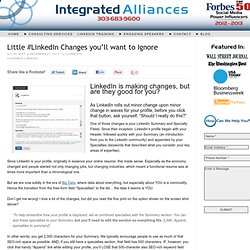
One of those changes is your LinkedIn Summary and Specialty Fields. 101 Books To Read This Summer Instead of '50 Shades of Grey'. Where the Marketing Elite Meet. Inspiration Break: Creative Confidence. Recently I recommended that you watch David Kelley’s TED talk on Creative Confidence, one of 10 talks chosen by TED for a playlist about the beauty—and difficulty—of being creative.
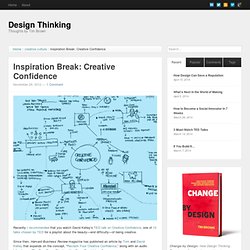
Since then, Harvard Business Review magazine has published an article by Tom and David Kelley that expands on the concept, “Reclaim Your Creative Confidence,” along with an audio interview on “The Four Fears Blocking You From Great Ideas.” As David and Tom describe it, creative confidence is the ability to come up with breakthrough ideas, combined with the courage to act.
Individuals with creative confidence live up to their potential to identify and launch creative solutions that solve unmet needs and create maximum impact on the world around them. What Neuroscience Really Teaches Us, and What It Doesn't. Mirror neuron. A mirror neuron is a neuron that fires both when an animal acts and when the animal observes the same action performed by another.[1][2][3] Thus, the neuron "mirrors" the behavior of the other, as though the observer were itself acting. Such neurons have been directly observed in primate species.[4] Birds have been shown to have imitative resonance behaviors and neurological evidence suggests the presence of some form of mirroring system.[4][5] In humans, brain activity consistent with that of mirror neurons has been found in the premotor cortex, the supplementary motor area, the primary somatosensory cortex and the inferior parietal cortex. [citation needed] The function of the mirror system is a subject of much speculation.
Discovery[edit] Further experiments confirmed that about 10% of neurons in the monkey inferior frontal and inferior parietal cortex have "mirror" properties and give similar responses to performed hand actions and observed actions. In monkeys[edit] Philosophy Talk. Gallery: The Top 25 Innovations of the Last 25 Years.
25 Definitions of Innovation. In a recent blog post proposing a definition of innovation, I noted that innovation means different things to different people.
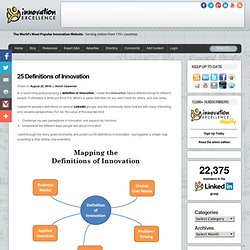
It ultimately is what you think it is. What’s a useful definition for you won’t work for others, and vice versa. I asked for people’s definitions on several LinkedIn groups, and the community came forward with many interesting and valuable perspectives. EconomicDevelopment. Business Rules of Thumb / FrontPage. Welcome to the Business Rules of Thumb wiki. Knowledge argument. Background[edit] A Review of the Universe. One Of The Greatest Speeches Ever Made - 11/10.
Audit of NY Fed Reveals Technocrat’s Creation and Cover-Up of Global Financial Crash. CREDIT WHERE CREDIT IS DUE: THE DIRECT WAY TO FIX THE CREDIT CRISIS. Ellen Brown, January 11, 2009 www.webofdebt.com/articles/creditcrunch.php Letter to the bank – Vickrey, William. 1996. 15 Fatal Fallacies of Financial Fundamentalism. Fifteen Fatal Fallacies of Financial Fundamentalism A Disquisition on Demand Side Economics William Vickrey. Dan Gilbert: The surprising science of happiness. Sacred economy = myopia. Experimental psychology: The roar of the crowd. A SOCIOLOGICAL SOCIAL PSYCHOLOGY: SOCIAL FACTORS SHAPING PERCEPTION AND DECISION-MAKING. Revisiting why incompetents think they’re awesome. Beautycheck - social perception. The Woman Who Changed Her Brain by Barbara Arrowsmith-Young: Review. Zoom. Karen Nussbaum. Stephen Toulmin. The Cynic's Sanctuary. A Girl You Should Date. BREAKING: You Know That TED Talk You Weren't Supposed To See? Here It Is.
The lost art of making plans - and sticking to them - Comment - Voices. Best News on All Topics. Bestsellers: Week Of May 24, 2012. Your Social Influence and Why Marketers Care About It. Why You Should Be Geeked About Data. Spotting Emotional Manipulation. Social Networking - Understanding Marketing. Does Social Media Marketing Really Work? [INFOGRAPHIC]